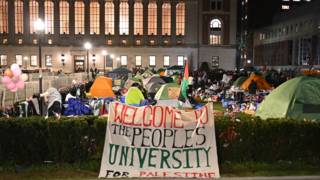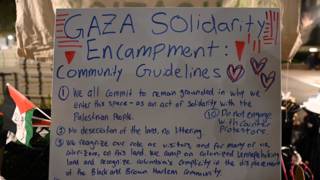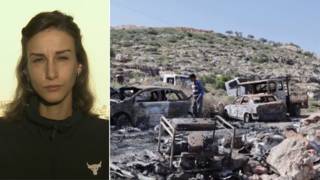
Related
Guests
We host a conversation about “Left Internationalism in the Heart of Empire,” which is the focus of an essay by Cornell University law professor Aziz Rana in Dissent magazine. Rana argues for the creation of a “transnational infrastructure of left forces across the world” and says movements of the left need “clear alternatives to the hardest questions” of foreign policy crises, such as the Russian war in Ukraine. We also speak with Darryl Li, professor at the University of Chicago, who is one of many scholars who published a response to Rana’s piece in the new issue of Dissent that highlights the importance of a nuanced and solution-oriented critical analysis of U.S. foreign policy.
Transcript
AMY GOODMAN: This is Democracy Now!, democracynow.org, The War and Peace Report. I’m Amy Goodman, with Nermeen Shaikh.
We end today’s show looking at “Left Internationalism in the Heart of Empire.” That’s the title of an essay in Dissent magazine by Aziz Rana, law professor at Cornell University, author of the book The Two Faces of American Freedom.
Rana writes, quote, “At present, the possible futures that lay before us appear strikingly dystopian: either we languish in an old, broken Pax Americana or we slide into a new multipolar order dictated by competing capitalist authoritarianisms. Without a strong and coherent left alternative, finding a global pathway better than these options will only be that much harder,” he says.
Dissent has also published responses to Professor Rana’s essay by a number of scholars, including the anthropologist Darryl Li, professor at University of Chicago, author of The Universal Enemy: Jihad, Empire, and the Challenge of Solidarity. Darryl Li and Aziz Rana join us now.
Let’s begin with professor Aziz Rana. Why don’t you lay out your argument in this major piece that you have written for Dissent that has gotten so much response?
AZIZ RANA: Well, first, thank so much for having me on the show. It’s great to be here.
So, the argument that I make is that if you just think of the long history of the national security establishment’s policies throughout the entire post-Cold War period, it’s one of repeated failure. So, these are terrible elective wars of choice in the Middle East, along with destructive neoliberal policies that have really promoted austerity and mass economic immiseration across large segments of the world, including coming back home in the U.S. And yet every time there’s a new international crisis, it’s as if that past is just wiped clean, and it’s instead left critics of the national security establishment to find themselves on the defensive. And so I try to kind of work through why that’s the case.
And the argument that I make is it has to do with certain tendencies in the way in which left voices articulate opposition to the national security framework. And it also has to do with the fact that the left really needs clear alternatives to the hardest questions, and that all of that requires thinking about foreign policy in a way that’s different than we traditionally do. We tend to think of the domestic realm as a site for mobilization, for movement building and for power building, but we think of foreign policy as about expertise. And that actually has to be broken.
The strongest periods of sustained left international foreign policy were times in which you had really powerful transnational movements, tied to labor and then tied to anti-colonial movements, that link together unions at home and abroad, as well as antiracist forces in the U.S. and anti-colonial forces overseas, and that we need something similar. We need to have strong transnational institutions built around mobilization that create and stitch together a common vision of what the future will hold. And that means pressing for policies that you might not oftentimes think of as about power building. Take, for instance, opposition or containment of international corporate property rights, strengthening global labor rights. These are good for workers, but they’re also a way of reviving perhaps the classic 20th century institution of the transnational left, which was global labor, that there needs to be infrastructures and homes to house conversations across borders about how to build an alternative world.
NERMEEN SHAIKH: So, Darryl Li, could we get your response? You are one of the respondents to Aziz in this special issue of Dissent on foreign policy, which is now out. One of the points that you make in your response is talking about the American left response to the crisis that ensued following the popular uprising in Syria in 2011. You write, quote, “while online leftists loudly tore each other to shreds, Washington and Damascus (backed by Moscow) quietly arrived at a modus vivendi whereby each side could bomb its enemies while they worked together to ensure their jets did not collide.” How do you interpret that response in 2011, and for many years after that, to what’s happening now with respect to the left response to the Russian invasion of Ukraine?
DARRYL LI: Good morning. Thanks for having me on.
I think the point that I was trying to make there sort of is the unfortunate mirror of the dilemma that Aziz lays out in his article, which is that in a series of crises since the end of the Cold War, where humanitarian intervention — or, better yet, humanitarian invasion — has been on the cards, the people who identify with the left in the West, in the United States, are constantly, again and again, kind of being pushed into a corner or boxed in. And I think it’s important to recognize that that’s a structural dilemma, right? Like, in any situation where there is talk about humanitarian invasion, we are talking about a situation of some kind of great power competition, right? Because if it was a situation where the West clearly had hegemony, we wouldn’t be talking about humanitarian invasion in the first place. And if it’s a situation where a non-Western great power is calling the shots, then the West doesn’t have a low-cost military option to begin with. So, in places like ex-Yugoslavia in the '90s, and then Libya and Syria later on, these are situations where, yes, the United States is engaged in acts of imperialism and violence, but it's also not the only significant actor on the ground. And that is the persistent structural dilemma that the left has really struggled with and just not had a clear answer to over the past few decades.
NERMEEN SHAIKH: The moment, in the case of Ukraine, at least initially, there was one clear aggressor, though now the equation has completely changed with the influx of massive amounts of military aid and defensive military equipment. So, can you speak specifically about that and how that complicates, or should complicate or may complicate, the U.S. left’s response?
DARRYL LI: Yeah, absolutely. I think it’s just a more intense version of the dilemma. Clearly, you have a war of aggression by Russia. But, of course, U.S. and NATO imperialism is another very important factor in the overall discussion.
And what’s been the thing that has really struck me about this conversation with folks on the left in the West is that it has largely kind of rested on a denunciation of hypocrisy and double standards by the West — right? — talking about why the U.S. is paying attention to Ukraine and not other places, or decrying the sort of racist treatment and abuse of refugees of African origin in the area. And I think calling out hypocrisy and double standards is absolutely necessary and just and correct, but it needs to be the start of the conversation, and too often it’s where the analysis sort of ends.
And I think that is actually a symptom of the kind of disempowerment that Aziz is talking about, where the left in the West has a clearer sense of what it stands against and not as clear a sense of what it stands for in these types of situations.
AMY GOODMAN: Professor Aziz Rana, if you could respond to Professor Li and also talk about what a genuine left global international would look like? You talk about the strengthening of labor rights around the world and formulating a critique of, undoing neoliberalism central to forming such a global movement.
AZIZ RANA: Yeah. So, you know, first, I agree pretty — I agree pretty entirely with what Darryl was just saying, which is that, you know, Ukraine in a way is a microcosm of this problem, which is that there are kind of two tendencies that you see in the U.S. So, you have one tendency, which, in the face of a kind of clear agenda from the U.S. national security state, that puts together a set of policies that are really a conveyor belt of policies that snap into place almost regardless of what the crisis is — and we’re seeing this again in Ukraine — that combine aggressive sanctions, militarized confrontation. One position is to just accede to what the state is doing. And so you have, for instance, the elected wing of the social democratic elements of the Democratic Party more or less just accepting whatever it is that the Biden administration is pursuing, up to and including defense spending in the context of Ukraine that exceeds or is equal to the entire State Department’s budget, so accepting an old separation between domestic and foreign, where foreign is not what you organize around, except if there are actual American boots on the ground. And so, that’s one position that I think is a kind of silence that’s a huge problem.
But then the other position is to avoid recognizing the incipient forms of, really, capitalist authoritarianism that we’re seeing in the breakdown of American unipolarity and the rise of a multipolar order, and so refusing to call out the kinds of imperialism and authoritarianism that doesn’t necessarily come out of the U.S. And so, it’s really important in this moment to have a politics that, as a colleague, Bassam Haddad, has noted, articulates a principle of anti-imperialism and anti-authoritarianism together.
Now, what I would say in the context of Ukraine is that this is an act of imperial aggression that is a violation of any anti-colonial principle of self-determination, and so it requires strong support for defensive military assistance of a country that’s facing an imperial invader. But the issue with the American approach is that that’s been combined with a geostrategic effort to really weaken a regional adversary, and so it’s been wrapped up in this aggressive sanctions and militarized confrontation policy that has really deleterious effects for the future of Europe, in my view, as well as for humanitarian conditions both in Ukraine but then also around the world.
And so, rather than accepting an either/or framework, where you can either sign up to everything that the U.S. does or just support nonintervention, I think it requires a disaggregated approach that emphasizes the importance, yes, of genuinely defensive military assistance, but that’s tied to a focus on deescalation, diplomatic negotiation, that puts front and center local concerns but also humanitarian suffering, and that is tied to a genuinely solidaristic global approach that looks at the humanitarian effects worldwide. We just heard about what was happening in Sri Lanka. And it’s, I think, a significant flaw of the American conversation that the fact that, as the U.N. secretary-general says, 1.7 billion people around the world, as a function of both the war and the sanctions approach, find themselves facing precarity in the context of global food, energy and financial crises, that hasn’t been part of the response. There’s clearly money. If there’s money for weapons to flood Europe, there’s certainly money to address some of these harms that are taking place far away from Ukraine and Russia. And that should be part of the conversation that we have. But that requires resisting the either/or framework that’s being presented.
And as far as, like, a global agenda, you know, there are lots of elements of what I think would be an important left foreign policy — confronting climate change, dealing with issues of economic redistribution, creating something like a genuinely different approach and a redistributive approach to the global commons. But I think the first and most important thing is creating the transnational infrastructure for left forces across the world to be able to speak to each other.
Whenever there’s a new crisis — and this is the last point that I’ll make. Whenever there’s a new crisis, it’s very easy for, you know, Biden to talk to Boris Johnson or to Zelensky, because there are these networks across nation-state organizations and national security frameworks. But the left has basically been contained over the last 50 years, in the context of conservative retrenchment, within its borders. And the folks that are talking about foreign policy, frankly, in the U.S. are people like me, which are kind of footloose academics that have no real connection to movements or to global institutions. And that actually has to be reversed, that you have to be able to build frameworks in which you have left forces across the world in conversation to build up alternative approaches.
And that, to me, puts a premium on the kinds of reforms, that we might think of as nonreformist reforms, that strengthen the power of transnational left institutions. So, this has to do with the position of the global labor movement, but it also has to do with the position of immigrants and migrant rights, so a strong commitment to decriminalizing the border, which is a way of strengthening working-class actors both within the U.S. and across the border, and it also has to do with significant changes to the nature of our security budget, cutbacks in the security budget, which then mobilize domestic forces around economic needs and show how economic needs, like pressing for a public commitment to health, education, housing, etc., are directly tied to the actions of the national security state and have implications for how American corporations and military elites operate abroad.
NERMEEN SHAIKH: Very quickly, Darryl — we just have 30 seconds, but we’re going to continue this conversation after the broadcast — you speak about the difficulty of what Aziz is saying, because, of course, the left position is determined in part by where you are in the world.
DARRYL LI: Yeah, absolutely. And I think solidarity is extremely important. I think it’s also true that solidarity is extremely messy. And for people on the left in the West, showing solidarity with people in other parts of the world can be more challenging or less challenging, especially if we’re talking about people whose primary oppressors, whose primary concern, are geostrategic rivals of the United States. But I think that’s all the more reason why it’s important to have robust institutions to allow these conversations to happen in the way that Aziz was pointing out.
AMY GOODMAN: And we’re going to do Part 2 and post it online at democracynow.org, Darryl Li of University of Chicago, as well as Aziz Rana of Cornell. I’m Amy Goodman, with Nermeen Shaikh. Stay safe.











Media Options